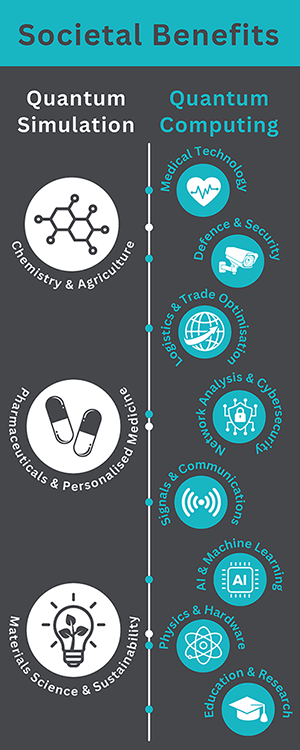Below you will find candidate applications for the 1,000-qubit quantum computing system envisaged by the OpenSuperQPlus project.
Quantum Simulation
Quantum simulators excel at modeling complex molecular and material systems, offering the following societal gains:
Chemistry & Agriculture
Precise simulation of nitrogen bonding could drive the development of catalysts that lower energy consumption in fertilizer production, reducing greenhouse gas emissions and food costs.Pharmaceuticals & Personalised Medicine
By accurately modeling drug-target interactions, quantum simulation can accelerate the discovery of novel therapeutics, cut R&D timelines, and enable treatments tailored to individual genetic profiles, improving outcomes and equity in healthcare.Materials Science & Sustainability
Designing advanced materials – such as superconductors that operate at higher temperatures or lightweight, ultra-strong composites — can revolutionise clean energy technologies (batteries, solar cells) and transportation (electric vehicles, aviation), driving a more sustainable economy.

Quantum Computing
General purpose quantum processors leverage superposition and entanglement to tackle large-scale computational problems unattainable by classical machines:
Medical Technology
Enhanced image reconstruction algorithms for CT and MRI scans can yield higher resolution diagnostics with lower radiation doses and faster turnaround times, improving early disease detection.Defence & National Security
Rapid analysis of complex battlefield scenarios and real-time optimisation of resource allocation bolster strategic planning and emergency response capabilities.Logistics, Transport & Trade Optimisation
Quantum algorithms can optimise delivery routes, supply chain schedules, and air traffic control simultaneously, reducing fuel consumption, congestion, and costs across global commerce networks.Network Analysis & Cybersecurity
Powerful graph analysis routines can detect and mitigate vulnerabilities in critical communication infrastructures, while quantum-safe cryptographic schemes protect sensitive data from next-generation attacks.
Signal Processing & Communications
Real-time processing of massive data streams (e.g. 5G/6G networks, satellite arrays) enables more robust, lower latency connections, underpinning the Internet of Things and smart city applications.Artificial Intelligence & Machine Learning
Quantum ML techniques can accelerate training of deep neural networks, enhance pattern recognition in large datasets (health records, climate models), and facilitate more accurate predictive analytics for public policy and finance.Physics Research & Hardware Improvement
Implementing error correcting codes and variational quantum algorithms refines qubit coherence and gate fidelities, driving the next generation of even larger quantum devices.Education & Fundamental Research
A 1,000-qubit testbed serves as a hands-on platform for training future scientists and engineers, democratising access to frontier computing paradigms and inspiring innovation across academia and industry.
By coupling quantum simulation’s ability to model nature’s intricacies with quantum computing’s strength in solving large scale optimisation and search problems, our 1,000 qubit system promises to accelerate scientific discovery, enhance economic efficiency, bolster security, and improve quality of life for society as a whole.